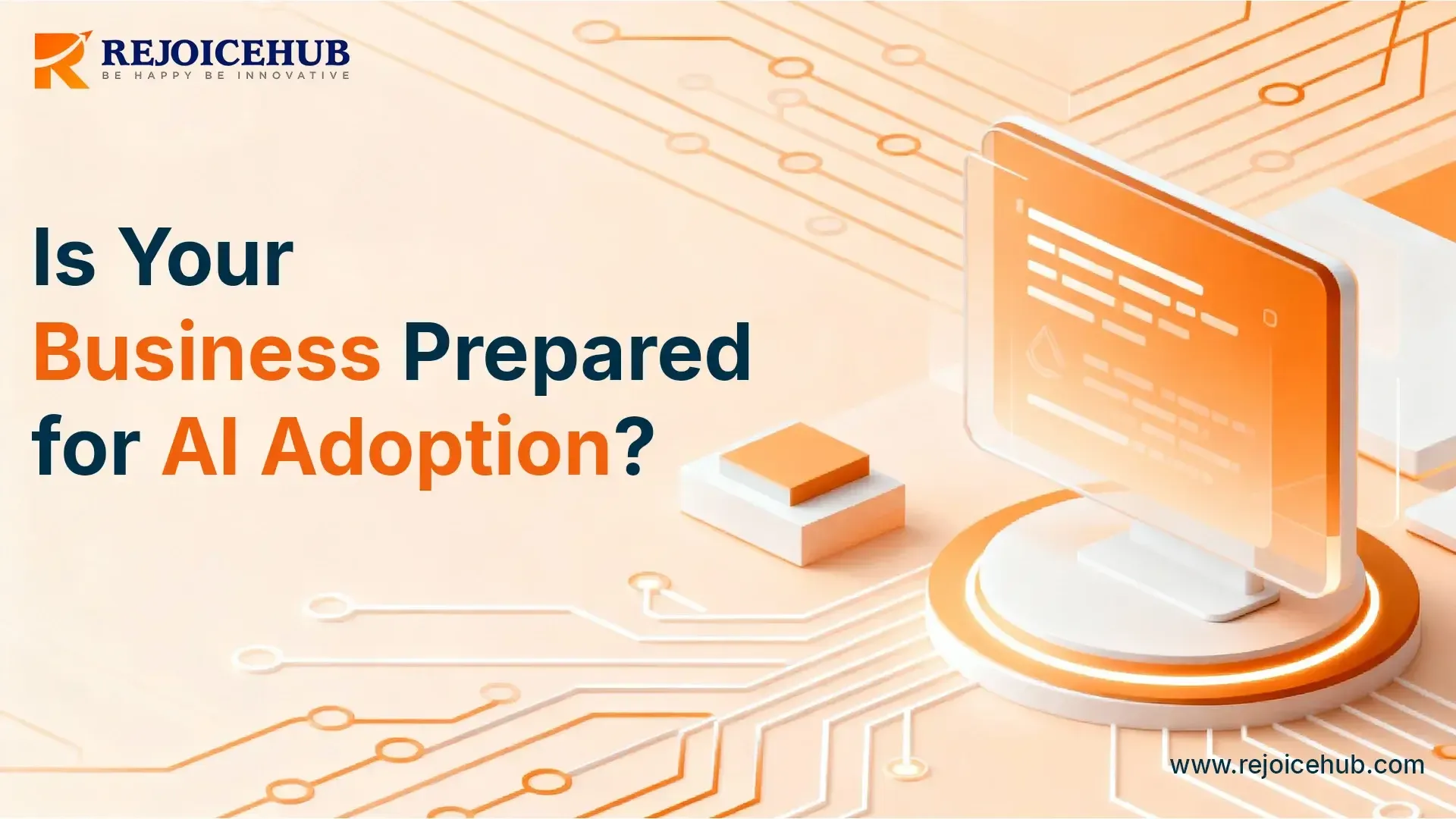
An AI readiness assessment is essentially a check-up for your business: it helps you find out if you're truly ready to bring artificial intelligence into your organization. It asks questions like: Do you have the right data setup? Is your team prepared? Is your culture ready for change? Do you have a strategy that aligns with your business goals? If any of those answers are shaky-you might run into trouble down the road.
Why is this so important? Because diving into AI without being prepared risks wasting time, money and energy. You could invest significant resources in AI solutions only to find they don't deliver-or worse, cause unexpected problems because foundational issues were overlooked.
Here's the bottom-line takeaway: Doing a solid AI readiness assessment is critical. You'll find weak spots before they become expensive mistakes-and uncover opportunities you might otherwise miss.
At Rejoicehub LLP, we help companies do exactly this: guiding them through the assessment process, helping with adoption strategy, and making sure their organization is genuinely ready.
What is an AI readiness assessment?
The term simply means: evaluating how prepared your organization is to successfully adopt and use AI technologies. This involves checking several dimensions: the quality of your data, the skills of your people, your infrastructure, governance, culture, and alignment with business goals.
It's not just about whether you can implement AI-but more importantly, how well you can make it work. The aim is to find gaps, so you can make informed decisions about where to invest, what to fix first, and how to map out a realistic plan for integrating AI.
Why should you run one?
There are three big reasons:
- Avoid implementation failures - By spotting issues early (like weak data quality, missing governance, or unclear strategy) you reduce the risk of expensive mis-steps.
- Secure stakeholder buy-in - A readiness assessment produces insight and evidence that helps persuade executives or investors about why AI matters and what's needed.
- Prioritize your investment - Instead of chasing every shiny AI opportunity, you can focus on where you'll get the most value-what's doable, what's aligned with your business, and what your organization can realistically support.
How does it work?
There are several common frameworks and approaches:
- Maturity-based models: scoring your organisation across dimensions like data management, infrastructure, culture.
- Self-evaluation tools/questionnaires: asking targeted questions to get quick insights.
- Capability assessments: comparing your current state with industry benchmarks or best practices.
- Custom frameworks: tailored assessments for specific industries or use-cases (because one size doesn't always fit all).
Many tools will give you a readiness "score" or maturity rating, along with recommendations about where the biggest gaps are.
Key areas you need to evaluate
When you run your assessment, make sure you cover these critical dimensions:
1. Business Strategy Alignment
- Are leadership and the executive team on the same page with AI?
- Are the goals for AI clearly mapped to business value (e.g. cost reduction, revenue growth, improved risk management, product innovation)?
- Is there documented strategy that everyone understands-not just "we're going to do AI because everyone else is"?
If your strategy is misaligned, you're likely to struggle to get traction, budgets, or meaningful results.
2. Data Foundations and Management
- How complete, accurate and up-to-date is your data?
- Do you have enough historical data for models? Are records clean (no duplicates/corrupt)?
- Is your data accessible across departments, or trapped in silos?
- Do you have strong data governance: ownership, privacy, lineage, version control?
Models are only as good as the data behind them. If your data foundation is weak, your AI investment may stumble.
3. Ethical Use, Transparency & Security
- Are you proactively managing bias, fairness, and unintended consequences?
- Can you explain how your models make decisions (especially important when they impact people)?
- Do you have security in place (access controls, encryption, incident response) to protect the system and the data it handles?
Responsible AI is becoming more than just "nice to have" - this is part of readiness too.
4. Organizational Culture & Skills
- Is your culture innovation-friendly? Are teams empowered to try and learn?
- Do you have the right mix of skills: domain experts, data scientists/engineers, ethics/compliance specialists, change-management leaders?
- Can your people translate AI possibilities into business terms? Are they adaptable and ready to learn?
Even with the best tech, weak culture or missing skills can sabotage projects.
5. Infrastructure Support
- Do you have sufficient computing resources (servers, GPUs, storage) and networking to handle AI model training and deployment?
- Is your architecture ready for integration: APIs, microservices, containerization, cloud/hybrid solutions, real-time pipelines?
- Without scalable infrastructure, even the best AI strategy will struggle to go from prototype to production.
6. Continuous Monitoring & Improvement
- Deploying AI is not "set and forget." You must monitor models for performance, drift, bias, and changing data distributions.
- Do you have dashboards, alerts, feedback loops, data-quality checks, regular audits?
- Are you prepared to retrain or adjust models as conditions change?
This ensures AI continues to support your business goals over time.
Practical steps to conduct your assessment
Here's a simple roadmap you can follow:
- Assemble your assessment team - Include stakeholders from business, data/IT, leadership, legal/compliance.
- Select your assessment framework - Pick a model or tool that aligns to your industry and size.
- Gather documentation & evidence - Collect existing policies, infrastructure descriptions, data governance docs, skill inventories. Don't rely on assumptions.
- Conduct stakeholder interviews - Talk to department heads, team leads, people who'll use the AI. This reveals cultural or operational gaps.
- Score and document your findings - Use consistent scoring across categories, document not only the score but why you gave that score (with examples).
- Create a phased action plan - Based on the gaps, decide what to focus on first: critical gaps, moderate improvement, and quick wins.
For example:
- If governance is weak (score below 40%), fix that before launching major AI pilots.
- If skills are moderate (score 40-60%), set up training or hire talent.
- If some areas are strong (above 70%), use them as launchpads for pilot projects.
What to do with your results
After your assessment:
- Look at each category's score. High scores indicate strengths you can build on; low scores expose risk areas to address.
- Don't just look at overall readiness-focus on which specific areas are weak. For example: maybe infrastructure is strong, but governance is weak-so you need oversight frameworks. Or data is good, but cultural readiness is low-so invest in training/change management.
- Use the results to craft a roadmap prioritize improvements, allocate budget, set timelines, align with business value.
- Use your strengths to pilot early initiatives; use your improvement areas as part of your preparedness work.
How external expertise can help
Dealing with AI readiness isn't just about ticking boxes-it's about customized insight and execution. That's where we help:
- We tailor the assessment to your industry and business context.
- We dive deep into your data architecture, skill gaps, culture, strategy.
- We don't stop at the report-we help you set up the roadmap, governance, training, and feedback mechanisms.
- We partner with you through the journey: from readiness assessment → pilot → scale; always aligned with business goals and ethics/compliance.
Conclusion
Starting with an AI readiness assessment is one of the smartest things you can do before committing to AI. Without it, you risk jumping into the AI craze and hitting problems you didn't see coming.
By assessing your strategy, data, culture, infrastructure, and more, you build the foundation to make AI deliver real value—to your team, your customers, and your business not just to look good on a slide.
And with the right support from Rejoicehub LLP through expert guidance, structured methodology, and continuous improvement you'll be in a strong position to ride the AI transformation wave with confidence.
Frequently Asked Questions
1. What is an AI readiness assessment?
An AI readiness assessment is an organized assessment that measures how ready your organization is to adopt and implement artificial intelligence. It is designed to evaluate your data quality, team competencies, infrastructure, governance, and alignment with your business objectives while identifying gaps and opportunities.
2. Why is an AI readiness assessment important?
It helps you to mitigate costly AI implementation failures by diagnosing issues early, including insufficient data structures, weak governance, or unclear strategy, and to ensure your organization has the right foundations to successfully deploy AI and unlock tangible value.
3. What domains are explored in an AI readiness assessment?
The main areas of exploration include alignment to business strategy, data foundations, organizational culture and skills, infrastructure, implementation and usage of AI in a responsible, ethical, and secure way, and continuous monitoring processes. These dimensions indicated how ready the organization truly is.
4. How do I conduct an AI Readiness Assessment for my business?
First, assemble a cross-functional, cross-cutting team, choose the best AI readiness assessment framework, collect documentation, interview stakeholder users, and score each readiness area. Once this is finished, create a phased action plan to address the identified gaps, identify and prioritize investments, and develop a road map for AI adoption.
5. How can Rejoicehub LLP assist with AI readiness?
Rejoicehub LLP offers an assessment of your AI readiness, customized to meet your company's specific needs, in a complete, end-to-end solution. We assess your strategy, data, culture, skills & infrastructure and present you with a roadmap, then partner with you through the implementation of the recommendations from the pilot phase to scaling, enabling your AI deployment. In doing so, we ensure your AI systems are implemented effectively, have business value, and comply with regulations.
